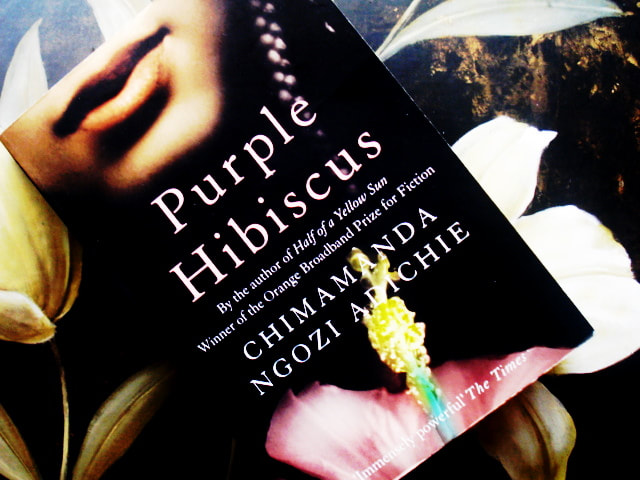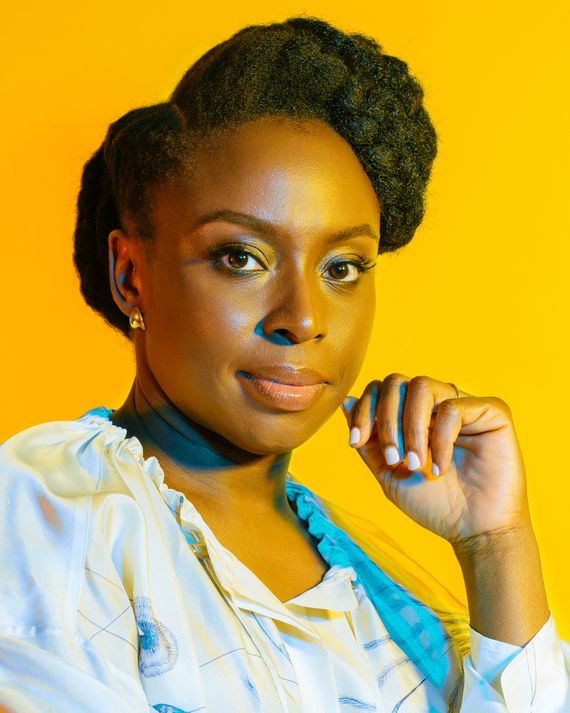Book Review of Chimamanda Ngozi Adichie's Purple Hibiscus

I absolutely adore Adichie’s books, so it was a joy to revisit Purple Hibiscus.
The story is told by fifteen year old Kambili whose father, Eugene, is a wealthy business man and prominent public figure. He takes huge personal risks in publishing stories in his newspaper, The Standard, that challenge the actions of the Nigerian government. In addtion, Eugene donates considerable sums to worthy charitable organisations and local families. He is a staunch Catholic and rejects wholeheartedly anything he considers heathen. This includes his own father who is a follower of traditional beliefs. Within his own household, however, Eugene is a cruel tyrant subjecting Kambili, her brother Jaja and her mother to horrendous physical and pyschological abuse.
Using an extended flashback Adichie tells the story of the events which lead to Jaja standing up to his father. He does this at first by not going to church. This act of rebellion initially seems like the ‘resolution’ of the story, but it is in fact followed by an additional section of text which reveals far more serious repercussions which then begin to unfold.
Through the voice of Kambili we are able to hear the power that abusers have over their victims. What makes Purple Hibiscus so fascinating is Adichie’s clever portrayal of the complexity of Eugene’s character. Whilst the reader primarily simply wants the abuse to end (in this respect it is similar to Tara Westover’s Educated) they are also fascinated by Eugene. Interestingly Eugene’s sister, Auntie Ifeoma doesn’t demonstrate any of the same cruel traits of character. She is seen as intelligent, open minded, poor and political.
In Purple Hibiscus we investigate religion, hypocrisy, politics, charity and culture. These are big issues which run alongside an almost separate ‘rites of passage’ story where we see Kambili fall in love with an unobtainable priest, Father Amadi.
The characterisation is fabulous in this story, the structure is effective and the political insight fascinating for anyone interested in Nigeria. Like all first person narratives, with an unreliable narrator, it is fascinating to consider the portrayal of character from alternate perspectives. What I found particularly interesting was how little space was given to exploring Kambili’s mother’s thoughts.
The only thing I’d change in Purple Hibiscus is affording a little more time to finding out what happens next, after Jaja’s release from prison. Perhaps there might be a sequel one day.

Book Discussion Questions on Adichie's Purple Hibiscus
What do you think are the reasons for Eugene’s behaviour?
What similarities can you see between Eugene and his sister? What is your opinion of Aunt Ifeoma’s parenting style?
Jaja was convicted for the crime, not his mother? The narrator says that no one believed her confession. What do you think?
Why did Jaja take the blame for the murder of his father?
Kimbali’s grandfather is known as a heathen to Eugene and a traditionalist to his sister. What does this difference in viewpoints reveal about their different attitudes to religion?
How is Father Amadi different to missionaries that Eugene and Auntie encountered when they were young?
Is there anything to reproach about Father Amadi’s behaviour?
What different types of inequalities are explored in the novel?
In the novel there are numerous instances of things not being what they seem. What examples can you think of where the appearance of events differs to the reality? Explore the significance of this?
What do the purple hibiscus symbolize?
Father Benedict is still considered to be the new priest, even though he has been in the role for seven years. This is, according to Kambile because he is white. Discuss the concept of being an outsider both in relation to this specific story and in literature more generally?
The story is set against the backdrop of political instability. Auntie Ifeoma is likely to leave Nigeria and move to America. This is criticized by her friends who claim that she will become a second class citizen in America. Discuss
Bookclub Questions on Adichie's Purple Hibiscus (if you haven't read the book!)
Adichie has written a small book (I was lucky enough to have my school Headteacher agree to give copies to all Year 12 students) where she outlines her views of feminism. I’ve linked to the clip in this post and the full transcript. It is utterly brilliant. If you have time watch or read this Ted Talk of We Should All be Feminists before your bookclub meeting and discuss its importance.
Adichie’s book. won what was then known as the Commonwealth Writers’ Prize for Purple Hibiscus.. The prize has since ceased to exist in the format it was in. This is what Salman Rushdie said about the prize. “Isn’t this the very oddest of beasts… a school of literature whose supposed members deny vehemently that they belong to it? Worse these denials are simply disregarded! It seems the creature has taken on a life of its own,” Discuss your views on ‘the Commonwealth’.
Eugene is descirbed as being too much the product of colonialism. Regardless of if you have read the book discuss what do you think this means?
Discuss the idea of using religion to justify controversial beliefs and actions.
It is through gardening and helping his aunt that Jaja starts to find a strength and purpose to his existence. What activity has helped you through difficult times
At different points in this story Kambili has all of her beliefs challenged. Have you ever felt the ground shift under your feet and lose everyhing you believed in? Would you like to share what happened?
Kimbala’s cousin is prejudiced against her because she has wealth and a seemingly privileged lifestyle. Have you ever allowed your own prejudices and jealousies to stop you seeing the truth of a situation?
What are the advantages and disadvantages of using a first person narrative when writing fiction?
Personal Response to Adichie's Purple Hibiscus
I remember when I read Purple Hibiscus the first time I was fascinated by the connections Adichie made, to Achebe’s Things Fall Apart. I was fascinated that she actually spent part of her childhood living in Achebe’s house – so cool! My first reading of Purple Hibiscus focused a lot on considering how colonialism was explored through the book. I think I felt that Adichie somehow was a figurehead for all modern Nigerian literature. Hardly fair on my part!
In this reading of Purple Hibiscus I spent less time exploring whether this was a modern take on the themes specific to ‘post-colonail literature’ and more time reflecting on the theme of domestic abuse that dominates the story.. This highlighted for me how we bring different things or priorities to the reading of a book. There is no such thing as objectivity. I absolutely loved revisiting Purple Hibiscus. it served to remind me what a top class writer Adiche is. I now need to re-read all of her books, especially Half of a Yellow Sun, which was one of the books I wrote on in my dissertation for a Masters Degree in English.